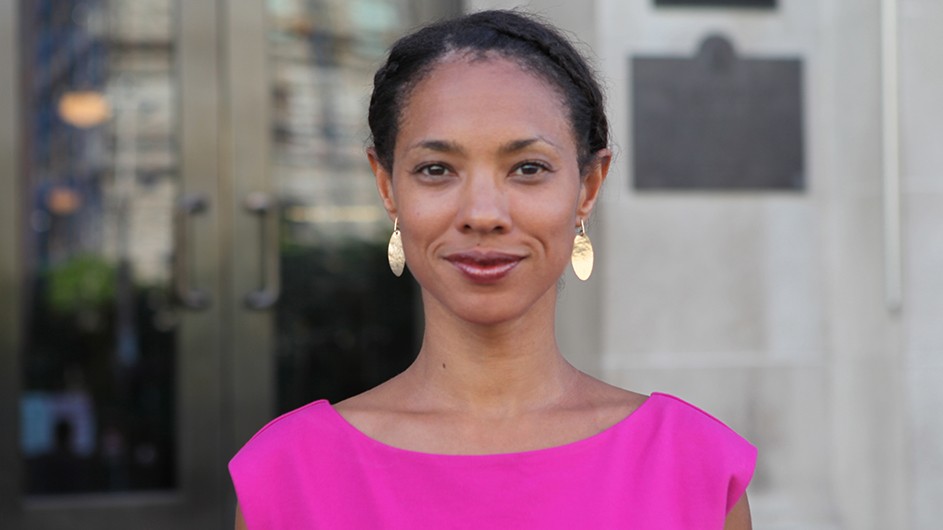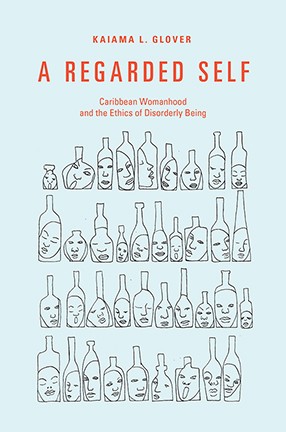Unruly Women Who Put Themselves First
A new book by Professor Kaiama Glover celebrates female protagonists who champion individual rights over community restraints.

In her new book, A Regarded Self, Kaiama Glover, the Ann Whitney Olin Professor of French and Africana Studies at Barnard, reframes Caribbean literary studies by championing unruly female protagonists who refuse to abide by the constraints of their communities. Concentrating on novels by Marie Chauvet, Maryse Condé, René Depestre, Marlon James, and Jamaica Kincaid, Glover shows how these authors' women characters enact practices of freedom that privilege the self in ways unmediated and unrestricted by group affiliation. They challenge the primacy of the community over the individual and propose provocative forms of being.
Glover elaborates on these ideas with Columbia News, as well as her thoughts on the gendered expectations of Black women now, her reading recommendations for the pandemic, and what the best book was that she ever received as a gift.
Q. Why did you write this book?
A. I wrote this book in the hopes of opening up a conversation about how we judge women's self-centeredness when that centering of the self doesn't contribute to an explicitly polis-facing agenda or practice. How do we value—do we value?—expressions of individual freedom that don't amount to explicitly anti-racist, feminist, or otherwise political projects? What is individual freedom worth if it doesn't attach to collective liberation?
I was looking for answers to those questions. And I wanted to think about how women's aspiring to adamant self-regard might be viewed as an ethical practice, even in the context of ostensibly progressive, liberating, or otherwise righteous communities—or communities that seem to be so, but are revealed to be differently coercive.
Q. Can you give some examples from the book of female protagonists who challenge the constraints of coercive communities?
A. Since the whole book is about protagonists who fit that description, you're really asking me to play favorites here. I can't do that, so I'll indulge in a few words on each of them. Maryse Condé's Tituba Indian goes head-to-head with the religious-cum-political patriarchal authority of the New England Puritans by adamantly privileging her own erotic humanity; Marie Chauvet's Lotus Delgrave literally puts her life on the line in a colorist political context where opposing communities do battle through women's bodies and within the domestic space; René Depestre's barely escaped zombie Hadriana Siloé breaks the mold of passive victim, refusing to let her self and its pleasures be sacrificed for the benefit of her struggling community.
Jamaica Kincaid's Xuela Claudette Richardson reminds us of the intramural conflicts around hemispheric American indigenism that remain unsettled within postcolonial Afro-Caribbean communities; Marlon James's Lilith chooses her self—and her complicated love for a white overseer—over the political solidarity offered by her enslaved would-be sisters.
Each of these women is arguably "politically incorrect," both with respect to her narrative community and to our extra-textual community of reader-scholars.

Q. Are there any lessons learned from these Caribbean literary characters that can be applied to crises that women face today?
A. This book emerged from my frustration with how virtue is often expected of women—especially Black women—as a condition of being treated as rights-deserving subjects. In this political climate, where #BlackGirlMagic and Black women's political contributions are being so widely recognized and heralded, I see these characters as calling on us to interrogate our demands for political heroism from women of color.
I'm struck by and, frankly, nervous about the gendered expectations that currently attach to women like Kamala Harris, LaTosha Brown, Keisha Lance Bottoms, among many others, and I think there may be a lesson in A Regarded Self about taking care not to put all the things we hope for and need politically on the shoulders of Black women.
Q. What books do you recommend for getting through the pandemic?
A. As someone for whom reading is a professional practice, I made a point over these last months to read books for pure pleasure—by which I mean books I wouldn't be immediately tempted to write an academic article about! I came up with a list of suggestions from friends who aren't academics and from my book-devourer of a 12-year-old daughter. Some titles I'll pass along here are: Tomi Adeyemi's Children of Blood and Bone; Sir Arthur Conan Doyle's The Further Adventures of Sherlock Holmes; Gabrielle Hamilton's Blood, Bones, and Butter; and Richard Powers' The Overstory.
Q. Any others on your reading list?
A. Children of Virtue and Vengeance, the sequel to Adeyemi's first book; Angela Davis's Blues Legacies and Black Feminism and Joanna Dee Das's Katherine Dunham, for a new project I'm working on; Yanick Lahens's Douces déroutes, which I'll also be translating.
Q. What's the last great book that you read?
A. Aimé Césaire's Notebook of a Return to My Native Land. This gorgeous prose-poem is canonical within the overlapping fields of Caribbean, French and francophone, and postcolonial literary studies, and I've read it scores of times, of course, but most recently I returned to it as part of an experiment in collective translating in close conversation. As a professional translator, I sincerely believe that the intimacy of rendering an author's words in a new language creates a richer, deeper path into a text. Coming back to the Notebook in this way was confirmation of that.
Q. What's the best book you ever received as a gift, and why?
A. When I was very little, my mother gave me a book called Never Talk to Strangers, written by Irma Joyce and illustrated by George Buckett. Originally published in the 1960s, it's basically a series of vignettes wherein two adorable little kids find themselves in various situations where they learn not to talk to even friendly seeming strangers (represented by various large animals).
What I most loved and still cherish about this gift is that, before giving it to me, my mother had taken the time to make all the characters the "right" color. She'd used a crayon to make all the human characters different shades of brown, like the people in our family and in our community. Back then, and still today, that book-gift reminds me of the work Black women constantly do to refashion the world for Black children. I've held on to it for decades and have read it many times to my own daughters.
Q. Are there any classic novels that you only recently read for the first time?
A. Octavia Butler's Xenogenesis series (Dawn, Adulthood Rites, Imago). After just a few pages, it became clear to me that there was a whole other direction my scholarship might have taken. If only I'd read these books 20 years ago!
Q. What are you teaching this term? How are you helping your students cope with online learning?
A. I'm not teaching this term, actually, but in the fall I taught two classes: an undergraduate French seminar, "Special Topics in Francophone Fiction: Disorderly Women," and a graduate French/Comparative Literature seminar, "The Caribbean Digital" (with my ur-collaborator, Alex Gil).
I've evolved in the last years into a modestly functional digital humanist, so I tried to bring some of that newly acquired expertise—and the not entirely conventional thinking it requires—into the classroom (the "zoom-room"). Like many of us, I used the interactive online annotation tool hypothes.is to encourage intellectual discussion and build community asynchronously around shared texts. This was meant to lessen somewhat the in-class (i.e., on-screen) "performance-load" for my students, and to help me get to know them and their ways of thinking a bit more intimately.
I also gave students the freedom to propose alternatives to more traditional seminar writing assignments—digital projects, blackout-poetry chapbooks, zines, visual artwork, maps, etc. This turned out to be as much of a boon for me—a more organic way of gauging what they'd managed to learn—as I had intended it to be for them.
Q. You're hosting a dinner party. Which three academics or scholars, dead or alive, would you invite and why?
A. Toni Morrison, because she has been a catalyst and a guide all the way along my evolution as a person and a thinker, and I'd love to hear her words for this moment. Also, I'd really like to know what kind of music she's into! I have my suspicions, but I imagine we'd talk about that over dinner.
Sara Ahmed, because I want to better understand—or at least witness up close and personal—the raw materials of her inextricably intellectual-emotional-political force. Reading her work, I always find myself wondering about the personal cost to her of being so generously and relentlessly transparent as an activism-grounded intellectual and intellectually grounded activist.
Maryse Condé, because she's brilliant and hilarious and pulls no punches when it comes to saying what she thinks, even at the risk of unsettling ostensible allies. Scholars have put her and Morrison—their work—together as objects of comparative study. I'd like to hear what they'd have to say to one another if they were actually in the same room, seated around the same table, with Sara Ahmed bringing her "feminist killjoy" sensibility to the party.
Check out Books to learn more about publications by Columbia professors.